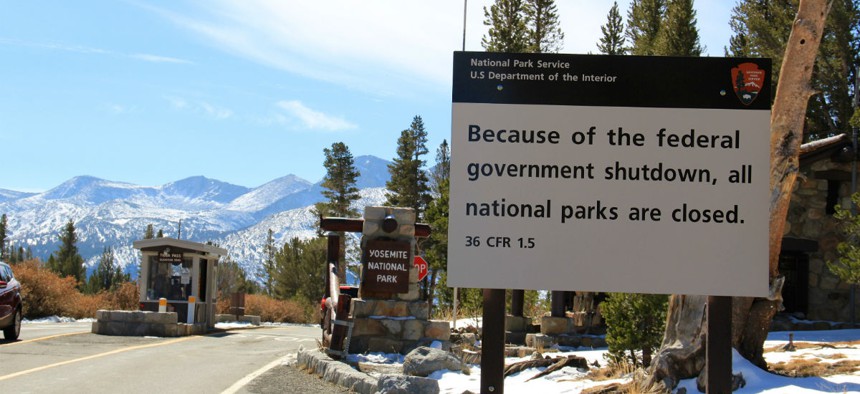
Flickr user daveynin
Trump Administration Seeks to Dismiss Shutdown Lawsuit
Justice Department attorneys argued in a recent court filing that a complaint over the legality of forcing employees to work without pay is moot.
Attorneys representing the Trump administration have asked a federal judge to dismiss a lawsuit alleging that agencies violated the Anti-Deficiency Act during the 35-day partial government shutdown, arguing that the claims brought by a federal employee union and a group of five federal employees are now moot.
In January, the National Treasury Employees Union, the National Air Traffic Controllers Association and a group of five federal workers filed lawsuits contesting how federal agencies’ determined that federal employees should be forced to work without pay during the lapse in appropriations. After the government reopened in late January, NATCA dropped its lawsuit, although the other parties have continued to seek review of their claims.
At the heart of the case is the plaintiffs’ assertion that the Trump administration’s interpretation of the Anti-Deficiency Act is overly broad, allowing agencies to require employees to work without pay regardless of whether they are needed to “protect life and property.” They cited the Internal Revenue Service’s decision in January to recall thousands of employees to help process income tax returns.
Last month, the Justice Department filed a motion to dismiss the remaining legal challenges arguing that now that federal agencies are open and employees have received back pay, the cases are moot.
“Here, even assuming a proper Article III dispute existed at the outset . . . these lawsuits are plainly moot now that the lapse in appropriations has ended,” wrote Assistant Attorney General Joseph Hunt. “All of plaintiffs’ claims sought to challenge the government’s actions during the lapse in appropriations . . . Because the challenged actions have now expired—i.e., because the lapse in appropriations is now over—plaintiffs’ claims are now moot.”
In a response filed earlier this month by NTEU, the union claimed that its arguments are covered under “capable of repetition, yet evading review,” an exception to rules governing whether an argument is moot that allows a court to hear claims in cases that have a short shelf life, but have a high probability of recurring.
“Indeed, no government shutdown has come close to lasting the two years presumptively required to allow the legal issues raised to be ‘fully litigated,’” wrote NTEU General Counsel Gregory O’Duden. “Unless NTEU’s legal claims are heard through the capable of repetition yet evading review doctrine, they will never be decided, even though the alleged injuries would reoccur during every future government shutdown.”
But the Trump administration argued that such a standard does not apply in this case, citing lawsuits brought during the 1995 and 2013 shutdowns which were found to be moot after the government reopened. Attorneys also wrote that the prospect of a future government shutdown is too speculative to qualify for the exception sought by plaintiffs.
“Regardless of whether plaintiffs’ claims evade review, plaintiffs also cannot demonstrate that the present dispute is genuinely likely to recur—i.e., that this same dispute, involving the same alleged wrongs, is likely to recur between the same parties,” Hunt wrote. “There are simply too many assumptions necessary for this court to conclude that these particular plaintiffs are reasonably likely to suffer the same harms in the future.”
NTEU countered that the previous instances where shutdown-related lawsuits were dismissed after the government reopened belie the trend toward political brinkmanship within the appropriations process.
“The recent history of government shutdowns leaves little doubt that there will be another one,” O’Duden wrote. “There have been 21 government shutdowns since Congress enacted the modern budgeting process 43 years ago; four of those lapses in funding have occurred in the last six years, and three of them have occurred in the last 16 months.”
The union’s lawyers also noted that while a future shutdown may not impact precisely the same set of federal workers, guidance from the Office of Management and Budget and agency shutdown plans that determine which employees are furloughed and which are excepted remain in effect.
“Should [another shutdown] occur, there is a reasonable expectation that at least one of the 33 federal agencies and departments at which NTEU represents bargaining unit employees would be affected and that thousands of them would be forced to work during the lapse,” NTEU wrote. “[Their] agencies would have designed them for work during the shutdown using legally deficient instructions from OMB that remain in force.”
Oral arguments over whether to dismiss the cases are expected in May.







